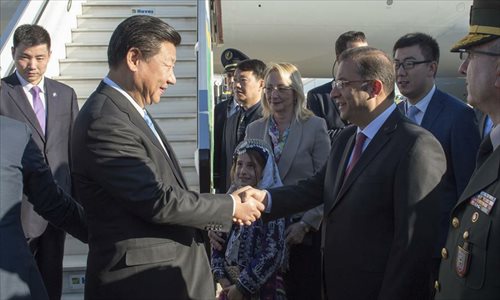Chinese president arrives in Turkey for G20 summit
Source:Xinhua Published: 2015-11-15 10:15:34

Chinese President Xi Jinping is greeted on his arrival at the airport in the Mediterranean coastal city of Antalya in southwest Turkey on Nov. 14, 2015. Xi arrived in Antalya on Saturday to attend the upcoming G20 summit. (Xinhua/Li Xueren)
Chinese President Xi Jinping arrived in the Mediterranean coastal city of Antalya in southwest Turkey Saturday to attend the upcoming G20 summit.Xi, the helmsman of the world's second-largest economy, will use this forum to share his views on boosting the sluggish global growth and enhancing global economic governance.
The president is to expound China's endeavors to deepen reform and build an open economy, and brief the world leaders on the country's overall vision for hosting next year's G20 summit.
His agenda at the Nov. 15-16 summit also includes meetings with other BRICS leaders as well as other foreign leaders.
After the summit, Xi will fly to Manila, the Philippines to attend the 23rd Asia-Pacific Economic Cooperation (APEC) Economic Leaders' Meeting scheduled for Nov. 18-19.
This year's G20 summit, the 10th of its kind since 2008, comes as the world economy is still being held back by slow and uneven recovery and shortfalls in demand, investment and infrastructure.
Themed with "collective action for inclusive and robust growth," the Antalya summit is expected to underpin global confidence and ensure strong, sustainable and balanced growth for the world economy.
G20 leaders will also discuss the reform of the international monetary and financial systems, trade, energy, development, anti-corruption, migration and terror at the two-day summit.
"China actively supports Turkey in hosting a successful summit," Chinese Vice Foreign Minister Li Baodong told reporters earlier this week. "President Xi's attendance demonstrates the great importance China attaches to the G20 cooperation."
The G20, or the Group of Twenty, is a main forum for global economic and financial cooperation that brings together the world's major advanced and emerging economies, representing around 85 percent of global GDP, 80 percent of world trade, and two-thirds of the world population.
The G20 started in 1999 as a meeting of finance ministers and central bank governors in the aftermath of the Asian financial crisis. The members include 19 individual countries along with the European Union.
In 2008, the first G20 Leaders' Summit was held in Washington, D.C. in the United States, and the group played a key role in the response to the global financial crisis.
The G20 members, at last year's Brisbane summit in Australia, agreed to lifting the collective economic growth by at least an additional 2 percent by 2018, which will bring an additional 2 trillion US dollars to the world economy, equal to the size of the Indian economy, and create millions of jobs.
"China has made significant contributions to the global economy through its own growth," Chinese Vice Finance Minister Zhu Guangyao told a news conference Tuesday on President Xi's Turkey trip.
He cited that Chinese economy expanded 6.9 percent in the first three quarters of this year, which contributed as high as 30 percent to the global growth although the third-quarter figure -- also 6.9 percent -- posted the lowest reading in six years.
"Chinese economy still enjoys good fundamentals, strong resilience and much leeway," Zhu said.
Meanwhile, some analysts say China shouldn't just focus on what contributions it can make to the global growth and economic governance, it should also learn how to use the governance rules and, how to reform the rules.
"The emerging economies lack experience in international governance and hadn't well grasped the opportunity in 2008, in the worst days of the financial crisis, to rebuild the global financial system," said Wang Wen, executive dean of the Chongyang Institute for Financial Studies at the Beijing-based Renmin University of China.
China will hold the rotating presidency of the G20 in 2016, and in Antalya, Xi is expected to reveal the host city and the date for next year's summit.
More importantly, the world is waiting to have a glimpse of -- through Xi's presentation -- China's vision for and approach to growth, development and sustainability.
It is widely believed that the president will refer to a key session held by the Communist Party of China late last month, which adopted proposals on the 13th five-year (2016-2020) plan for the country's economic and social development.
According to the proposals, China aims to double its 2010 GDP and per capita income by 2020, and Xi has sent a clear signal that annual expansion of only 6.5 percent would be enough to meet its goal as the Chinese economy has entered a "new normal" period and is targeting "medium-high growth," or slower but quality growth.
On the vision for development, five adjectives were employed by the decision-makers to chart the course for China's future path: innovative, coordinated, green, open and shared.
"China will join hands with other G20 members to help the Antalya summit adopt responsible macroeconomic polices, thus bringing about positive spillover effects on other countries," Li Baodong said.
Posted in: Diplomatic Channel, Diplomacy